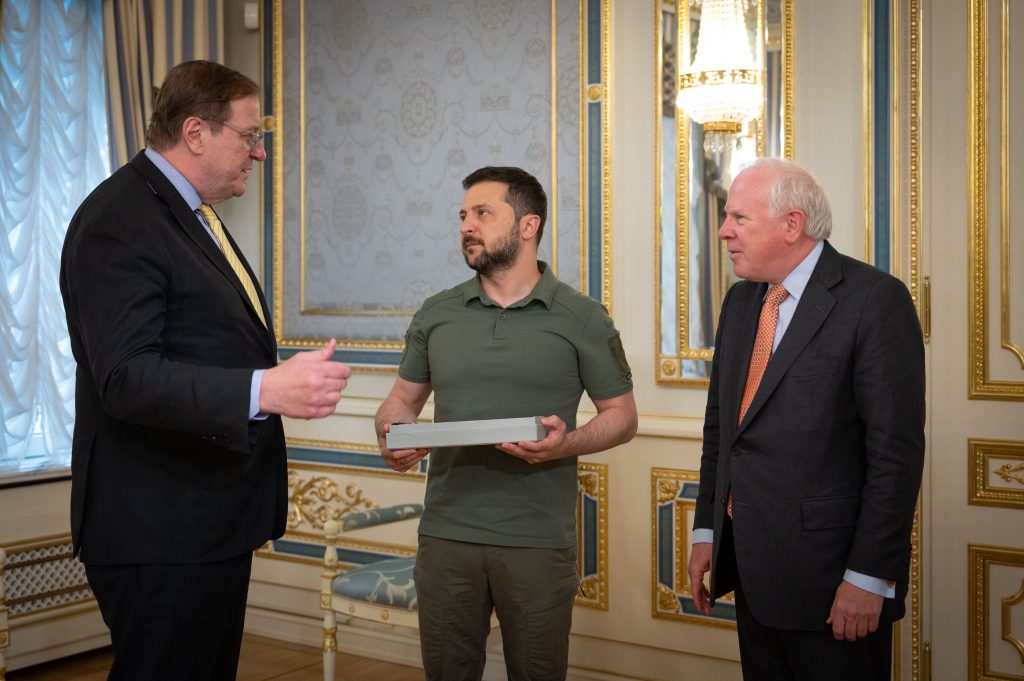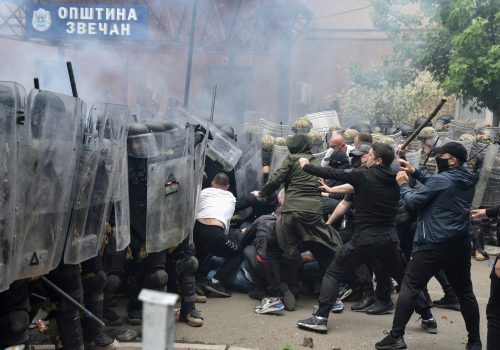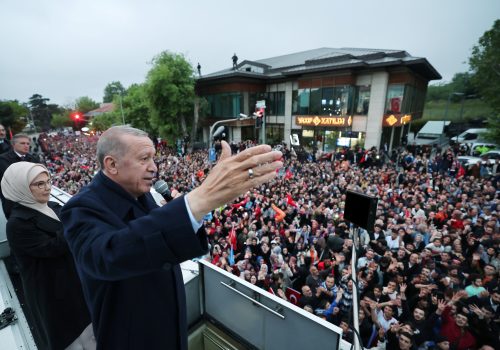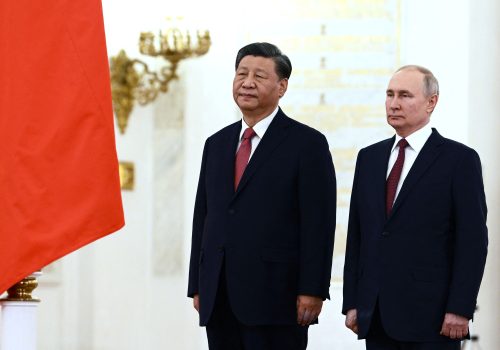The air raid siren sounded at 3:00 a.m. on Thursday morning, several hours after the Atlantic Council’s meeting with Ukrainian President Volodymyr Zelenskyy in his well-fortified offices, sounding the arrival of ten Russian Iskander ballistic missiles in Kyiv airspace.
Each of them—more than twenty feet long and weighing in at more than four tons—served as a further reminder that the time was over for providing half measures in supporting Ukraine. After fifteen months of withstanding and pushing back against Moscow’s aggression—acting in the interests of free people everywhere—Ukraine deserves support: faster and larger deliveries of ammunition, more plentiful supplies of Patriot and other air defenses, longer-range missiles to hit targets within Russia (that are killing Ukrainians) and, as rapidly as possible, F-16s and other fourth-generation fighter jets to reduce Moscow’s deadly air superiority.
Most of all, Ukraine deserves NATO membership. Given the generational consequences of Ukrainians’ struggles, NATO should provide much clearer and more robust security guarantees to Ukraine at the Alliance’s Vilnius summit in July. Most urgently, NATO should provide a concrete path to membership, including the timing and avenues for a fast-track accession decision by the Alliance’s seventy-fifth-anniversary summit in Washington next April. To put that off until after Russia’s war ends or until Russia withdraws from Ukrainian territory only encourages Russian President Vladimir Putin’s aggression.
Mercifully on that Thursday morning, US-provided Patriot air defense systems took out all of the incoming Iskanders, but the fragments still killed three Ukrainians (including a woman and her nine-year-old child) and injured eleven others, adding to the victims from Russia’s murderous war. Dozens more would have been killed this week, the deadliest week in Kyiv in months, had the United States and other allied systems not been put in place in April, after long months of discussions.
After Ukrainian reports that Patriot missiles shot down a Russian hypersonic weapon for the first time on May 4 and six more in a single night two weeks later, Zelenskyy reflected with one of his top advisers on how many hundreds more Ukrainian lives might have been saved had the deliveries come faster. He also pondered how many more Ukrainians might die on the front lines in the coming summer offensive because the F-16s won’t be providing air cover for months to come, telling the Wall Street Journal that the lack of protection means “a large number of soldiers will die.”
However, in our meeting with Zelenskyy this week, where we presented him with the Atlantic Council Global Citizen Award, he adopted his more familiar public posture of looking forward and doing what he can to maintain domestic and international unity.
“I’m not looking at the past, but rather to the future,” he said. “We have to achieve comparable airpower to Russia in the sky.” He spoke about the historic cost not just to Ukraine, but also to Europe, the United States, and the world, should his country come up short. “We can’t be losers,” he said.
And that brought him to NATO’s upcoming Vilnius summit.
His advisers have briefed him on the options allies are said to be discussing regarding Ukraine, ranging from a security relationship akin to that between the United States and Israel, of robust weapons deliveries and intelligence exchanges, to the renaming and repurposing of a body at which NATO meets regularly with Ukraine in order to give it more heft.
Zelenskyy noted that Ukraine lacks the deterrent power of Israel’s nuclear capabilities, which it gave up along with Kazakhstan and Belarus after signing the Budapest Memorandum on Security Assurances in 1994, when Russia provided assurances that it wouldn’t use military force or economic coercion against Ukraine or the others.
Given the urgency of their war with Russia, most Ukrainians would see a more robust consultative body within NATO as window dressing if it didn’t come with membership certainties. More NATO members are coming to realize that as well, with French President Emmanuel Macron telling the GLOBSEC conference in Slovakia this week that Ukraine deserved to be included “in an architecture of security.”
As Zelenskyy said to our delegation, “if Ukraine will not be given some hope at Vilnius, it will be demoralizing for our soldiers. It will be seen as a big message to our soldiers and people.”
If NATO doesn’t come forward with “more ambitious ideas” at its summit, Zelenskyy indicated to us, it might not be appropriate for him to accept the Alliance’s invitation to attend. “I don’t want to betray our people,” he said, sensing Ukrainians would feel underappreciated for the irreplaceable role they are playing on Europe’s front lines against Russian aggression.
“We need the world not to be afraid of Russia,” he said. His unstated message was clear: The world’s fears about Russia’s potential escalation of its war in Ukraine, up to and including the use of tactical nuclear weapons, have prevented more robust support at earlier stages—but that was the opposite of what would better deter Putin.
A short week’s stay in Ukraine underscores two inescapable realities as the country braces for its long-anticipated summer counteroffensive, which is expected to begin in the coming days.
The first reality is that without the remarkable level of US and partner support thus far, it would have been impossible for Ukrainians to have held the line against Russian adversaries, who are more numerous, are well-armed, and maintain still far superior airpower.
The second reality, however, is that the cautiousness and relative slowness in those deliveries of support have prevented the Ukrainians from making more rapid gains, made it harder to prevent civilian casualties, and made it harder for Ukraine to retake enough territory to force Russia to the negotiating table, prolonging the war.
As certainly as West Berlin’s survival was a pre-condition for Cold War victory, and as certainly as Poland’s Solidarity movement and democratic change laid the ground for Soviet collapse, so it is now Ukraine’s fate as a free and democratic nation—integrated into the European Union and NATO—that will be at the center of the context for Europe’s future.
Our Kyiv interlocutors (Ukrainian military strategists) see three potential scenarios for their coming summer counteroffensive.
The first, and most desired but least likely outcome, would be a complete Russian military collapse and retreat. The second, and more likely outcome, would be for Ukraine to achieve sufficient battlefield and territorial gains in the nearly twenty percent of Ukraine that remains in Russian hands to force a Putin reassessment and better negotiating terms. The third, and the most feared outcome, would be a Ukrainian failure in the summer offensive that would demoralize Ukrainians and dishearten their international backers.
The stakes for Ukraine in the coming months are enormous. Yet the stakes for the United States and Ukraine’s other friends may be even greater over time. In recognizing that, it will be easier to make the tough decisions regarding weapons and NATO membership that are so urgently required.
Frederick Kempe is president and chief executive officer of the Atlantic Council. You can follow him on Twitter @FredKempe.
THE WEEK’S TOP READS
#1 Fake Signals and American Insurance: How a Dark Fleet Moves Russian Oil
Christiaan Triebert, Blacki Migliozzi, Alexander Cardia, Muyi Xiao, and David Botti | NEW YORK TIMES
In this powerful report, New York Times reporters track several cargo ships moving oil between Russia and China in violation of US sanctions and explain the technology and methodology these cargo ships use.
“The vessels,” they report, “are part of a so-called dark fleet, a loose term used to describe a hodgepodge array of ships that obscure their locations or identities to avoid oversight from governments and business partners.”
Moreover, as the Times points out, such tactics are not isolated to Russia. “[The dark fleet’s ships] have typically been involved in moving oil from Venezuela or Iran—two countries that have also been hit by international sanctions,” the authors write. “The latest surge of dark fleet ships began after Russia invaded Ukraine and the West tried to limit Moscow’s oil revenue with sanctions.” Read more →
#2 Bakhmut and the spirit of Verdun
ECONOMIST
The Economist compares the Russian assault on Bakhmut with the German assault on Verdun over one hundred years ago during World War I, and considers how Ukraine’s heroic defense has ground down the Russians and upheld the Ukrainian spirit of heroic defiance.
“Above all,” the Economist writes, “each place has acquired a symbolic importance that outweighs its original strategic value. At Verdun, the French were caught ill-prepared. Under Philippe Pétain’s command, they built resistance around the rotation of forces, limiting soldiers’ time at the front and supplying the effort by road from Bar-le-Duc. ‘They shall not pass’ became the Verdun battle cry, a defiant call to hold the town, just as President Volodymyr Zelenskyy called Bakhmut ‘our fortress.’”
“‘What Bakhmut shares with Verdun is the notion of prestige,’ says Nicolas Czubak, a historian at the Verdun Memorial. The war was not won or lost at Verdun; but the French turned it into an emblem of strength that made retreat unthinkable.” Read more →
#3 How the US is deepening military alliances in China’s backyard
Demetri Sevastopulo and Kathrin Hille | FINANCIAL TIMES
To understand the Biden administration’s increased efforts to counter China using alliances, read this Financial Times report on the steps the United States has taken to build up a Pacific security architecture and what remains to be done.
The FT notes that “the US is not only focused on its biggest allies. It has also been forced to step up cooperation with smaller Pacific Island nations after Beijing shocked Washington last year by signing a security pact with the Solomon Islands. In response, the US last week signed a security pact with Papua New Guinea and extended so-called Compact of Free Association agreements with Palau and the Federated States of Micronesia—deals that will give the US military exclusive access to facilities for two decades.”
“Arguably the biggest challenge for the US, however,” the FT reports, “is to get its allies to the point where they are conducting joint operational exercises based on actual joint war plans. This particularly applies to Japan and Australia, the nations most likely to fight alongside the US in a war in the region.” Read more →
#4 The Illusion of China’s AI Prowess
Helen Toner, Jenny Xiao, and Jeffery Ding | FOREIGN AFFAIRS
As this smart Foreign Affairs analysis explains, one of the great ironies of Chinese leader Xi Jinping’s much touted authoritarian model is that the censorship it necessitates also hobbles China’s development of artificial intelligence (AI), by drastically limiting what Chinese scientists can include in the large language models, or LLMs, that underlie AI chatbot technology.
“Over the past three years,” Toner, Xiao, and Ding write, “Chinese labs have rapidly followed in the footsteps of US and British companies, building AI systems similar to OpenAI’s GPT-3 (the forerunner to ChatGPT), Google’s PaLM, and DeepMind’s Chinchilla. But in many cases, the hype surrounding Chinese models has masked a lack of real substance. Chinese AI researchers we have spoken with believe that Chinese LLMs are at least two or three years behind their state-of-the-art counterparts in the United States—perhaps even more. Worse, AI advances in China rely a great deal on reproducing and tweaking research published abroad, a dependence that could make it hard for Chinese companies to assume a leading role in the field. If the pace of innovation slackened elsewhere, China’s efforts to build LLMs—like a slower cyclist coasting in the leaders’ slipstream—would likely decelerate.” Read more →
#5 To Protect Europe, Let Ukraine Join NATO—Right Now
Andriy Zagorodnyuk | FOREIGN AFFAIRS
In this must-read essay, former Ukrainian defense minister Andriy Zagorodnyuk (an Atlantic Council distinguished fellow) makes a strong case for immediate Ukrainian membership of NATO.
“It is time, then, to let Ukraine join—not sooner or later, but now,” Zagorodnyuk writes. “By entering the Alliance, the country will secure its future as part of the West, and it can be sure the United States and Europe will continue to help it fight against Moscow. Europe, too, will reap security benefits by allowing Ukraine to join the Alliance. It is now apparent that the continent is not ready to defend itself and that its politicians have largely overestimated its security. Indeed, Europe will never be secure from Russia until it can militarily stop Moscow’s attacks. And no state is more qualified to do so than Ukraine.”
“Ukraine should join NATO right away,” Zagorodnyuk adds. “But unfortunately, it will almost certainly have to wait. It takes a unanimous vote to add a country to the Alliance, and there are still far too many governments that remain opposed to the country’s ascension. But in Vilnius, NATO should at least move beyond vague promises about Ukraine’s future and get down to the specifics of helping Kyiv join the organization. It is time for Western states to stand firm against bullies and stop giving Russia (or any other outside state) a voice in the security architecture of an organization that considers it an adversary. Instead, now is the time for NATO to start strengthening itself, and bringing in Ukraine is essential to accomplishing this task. No state, after all, knows more about how to fight back against the Kremlin. In fact, no country has more current experience fighting large-scale wars anywhere. Ukraine’s only peer is Russia itself.” Read more →
Atlantic Council top reads
Image: Atlantic Council President and CEO Fred Kempe and Atlantic Council Chairman John F. W. Rogers speak to Ukrainian President Volodymyr Zelenskyy after presenting him with the Atlantic Council's Global Citizen Award



